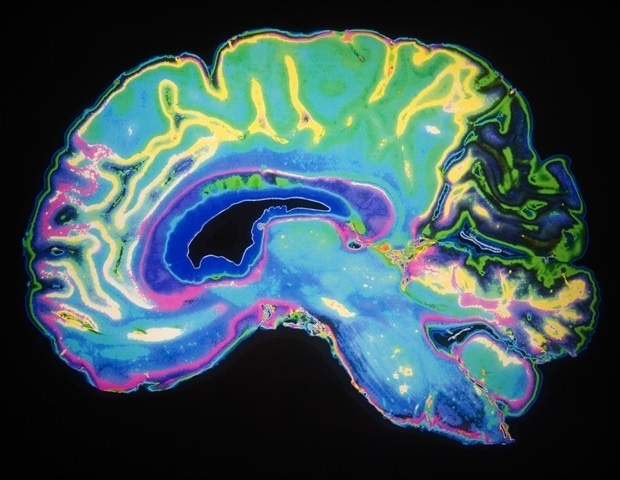Health
MIT Study Uncovers Brain Mechanisms Behind Sleep Deprivation Effects

A recent study from the Massachusetts Institute of Technology (MIT) has unveiled critical insights into the brain’s functioning during periods of sleep deprivation, revealing how lapses in attention correlate with physiological changes. The research, published in the journal Nature Neuroscience, highlights that a wave of cerebrospinal fluid (CSF) flows out of the brain during these moments, a process typically associated with sleep that is essential for clearing waste products accumulated throughout the day.
The study, led by Laura Lewis, the Athinoula A. Martinos Associate Professor of Electrical Engineering and Computer Science at MIT, involved 26 volunteers who underwent tests in a lab setting. Participants experienced two conditions: one after a night of sleep deprivation, and another after a full night of rest. The results indicated that lack of sleep significantly impaired attention, leading to slower response times in tasks designed to assess cognitive function.
During the experiments, each participant wore an electroencephalogram (EEG) cap to monitor brain activity while undergoing a modified functional magnetic resonance imaging (fMRI) scan. This advanced fMRI technique enabled researchers to observe not only blood flow but also the dynamics of CSF movement in the brain. As participants engaged in both visual and auditory attention tasks, the study noted that sleep-deprived subjects exhibited marked declines in performance.
The findings suggest a direct link between attentional lapses and CSF flow. Specifically, the researchers discovered that when attention waned, CSF was expelled from the brain, only to return during moments of cognitive recovery. “If you don’t sleep, the CSF waves start to intrude into wakefulness where normally you wouldn’t see them. However, they come with an attentional tradeoff,” Lewis explained.
Physiological Changes and the Sleep-Deprivation Connection
The study’s implications extend beyond cognitive performance; it suggests that the brain attempts to compensate for lost cleansing processes typically achieved through sleep. Zinong Yang, the lead author of the paper, emphasized that the brain strives for a sleep-like state to restore cognitive abilities. “Your brain’s fluid system is trying to restore function by pushing the brain to iterate between high-attention and high-flow states,” he noted.
Alongside the CSF dynamics, the researchers observed other physiological changes associated with attentional failures. These included decreases in heart rate, breathing rates, and pupil constriction, which began approximately 12 seconds before lapses in attention occurred. Lewis remarked on the interconnectedness of these systems, stating, “This isn’t just a phenomenon in the brain; it’s also a body-wide event.”
The study proposes that a unified circuit could govern both high-level cognitive functions, such as attention, and fundamental physiological processes like fluid dynamics and heart rate. While the specific circuit controlling this interaction remains to be explored, the noradrenergic system has been identified as a potential candidate due to its regulation of various cognitive and bodily functions through the neurotransmitter norepinephrine.
The research was supported by several prestigious funding sources, including the National Institutes of Health and various fellowships aimed at advancing scientific understanding.
In summary, this MIT study sheds light on the intricate relationships between sleep, brain function, and attention, emphasizing the importance of adequate rest for maintaining cognitive performance and overall brain health. The exploration of these mechanisms may pave the way for further research aimed at understanding and mitigating the effects of sleep deprivation on cognitive function.
-

 World3 days ago
World3 days agoCoronation Street’s Shocking Murder Twist Reveals Family Secrets
-

 Entertainment4 months ago
Entertainment4 months agoKate Garraway Sells £2 Million Home Amid Financial Struggles
-

 Entertainment3 months ago
Entertainment3 months agoAnn Ming Reflects on ITV’s ‘I Fought the Law’ Drama
-

 Health3 months ago
Health3 months agoKatie Price Faces New Health Concerns After Cancer Symptoms Resurface
-

 Entertainment3 weeks ago
Entertainment3 weeks agoCoronation Street Fans React as Todd Faces Heartbreaking Choice
-

 World4 weeks ago
World4 weeks agoBailey Announces Heartbreaking Split from Rebecca After Reunion
-

 Entertainment6 days ago
Entertainment6 days agoTwo Stars Evicted from I’m A Celebrity Just Days Before Finale
-

 World6 days ago
World6 days agoKevin Sinfield Exceeds Fundraising Goal Ahead of Final Marathons
-

 Entertainment3 months ago
Entertainment3 months agoCoronation Street’s Carl Webster Faces Trouble with New Affairs
-

 Entertainment3 months ago
Entertainment3 months agoWhere is Tinder Swindler Simon Leviev? Latest Updates Revealed
-

 Entertainment4 months ago
Entertainment4 months agoMarkiplier Addresses AI Controversy During Livestream Response
-

 Science2 months ago
Science2 months agoBrian Cox Addresses Claims of Alien Probe in 3I/ATLAS Discovery





















